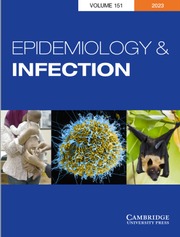Crossref Citations
This article has been cited by the following publications. This list is generated based on data provided by
Crossref.
SMITH, M. G.
1976.
R factor transfer in vivo in sheep with E.coli K12.
Nature,
Vol. 261,
Issue. 5558,
p.
348.
Smith, M. G.
1977.
In vivotransfer of an R factor within the lower gastro-intestinal tract of sheep.
Journal of Hygiene,
Vol. 79,
Issue. 2,
p.
259.
LINTON, A.H.
1977.
Antibiotics and Antibiosis in Agriculture.
p.
315.
Milch, Hedda
1978.
Vol. 11,
Issue. ,
p.
87.
Sansonetti, P
Lafont, J P
Jaffé-Brachet, A
Guillot, J F
and
Chaslus-Dancla, E
1980.
Parameters controlling interbacterial plasmid spreading in a gnotoxenic chicken gut system: influence of plasmid and bacterial mutations.
Antimicrobial Agents and Chemotherapy,
Vol. 17,
Issue. 3,
p.
327.
Stotzky, G.
and
Krasovsky, V. N.
1981.
Molecular Biology, Pathogenicity, and Ecology of Bacterial Plasmids.
p.
31.
FENLON, D.R.
1984.
Antimicrobials and Agriculture.
p.
243.
Stotzky, G.
and
Babich, H.
1986.
Advances in Applied Microbiology Volume 31.
Vol. 31,
Issue. ,
p.
93.
SOVEY, JAMES
ZANA, LYNNETTE
and
KNOWLES, STEVEN
1987.
Electromagnetic emission experiences using electric propulsion systems - A survey.
Miller, Robert V.
1988.
Potential for transfer and establishment of engineered genetic sequences.
Trends in Biotechnology,
Vol. 6,
Issue. 4,
p.
S23.
Flint, Harry J.
1994.
Molecular genetics of obligate anaerobes from the rumen.
FEMS Microbiology Letters,
Vol. 121,
Issue. 3,
p.
259.
Scott, Karen P.
and
Flint, H.J.
1995.
Transfer of plasmids between strains of Escherichia coli under rumen conditions.
Journal of Applied Bacteriology,
Vol. 78,
Issue. 2,
p.
189.
Teather, R. M.
Hefford, M. A.
and
Forster, R. J.
1997.
The Rumen Microbial Ecosystem.
p.
427.
Blake, D.P.
Hillman, K.
Fenlon, D.R.
and
Low, J.C.
2003.
Transfer of antibiotic resistance between commensal and pathogenic members of the Enterobacteriaceae under ileal conditions.
Journal of Applied Microbiology,
Vol. 95,
Issue. 3,
p.
428.
Brown Kav, Aya
Benhar, Itai
and
Mizrahi, Itzhak
2013.
Lateral Gene Transfer in Evolution.
p.
105.
Edrington, T. S.
Farrow, R. L.
Hume, M. E.
Anderson, P. N.
Hagevoort, G. R.
Caldwell, D. J.
Callaway, T. R.
Anderson, R. C.
and
Nisbet, D. J.
2013.
Evaluation of the Potential Antimicrobial Resistance Transfer from a Multi-Drug Resistant Escherichia coli to Salmonella in Dairy Calves.
Current Microbiology,
Vol. 66,
Issue. 2,
p.
132.
Bythwood, Tameka N.
Soni, Vivek
Lyons, Karen
Hurley-Bacon, Anne
Lee, Margie D.
Hofacre, Charles
Sanchez, Susan
and
Maurer, John J.
2019.
Antimicrobial Resistant Salmonella enterica Typhimurium Colonizing Chickens: The Impact of Plasmids, Genotype, Bacterial Communities, and Antibiotic Administration on Resistance.
Frontiers in Sustainable Food Systems,
Vol. 3,
Issue. ,
Samanta, Indranil
and
Bandyopadhyay, Samiran
2020.
Antimicrobial Resistance in Agriculture.
p.
153.
Oxendine, Aaron
Walsh, Allison A.
Young, Tamesha
Dixon, Brandan
Hoke, Alexa
Rogers, Eda Erdogan
Lee, Margie D.
and
Maurer, John J.
2023.
Conditions Necessary for the Transfer of Antimicrobial Resistance in Poultry Litter.
Antibiotics,
Vol. 12,
Issue. 6,
p.
1006.

